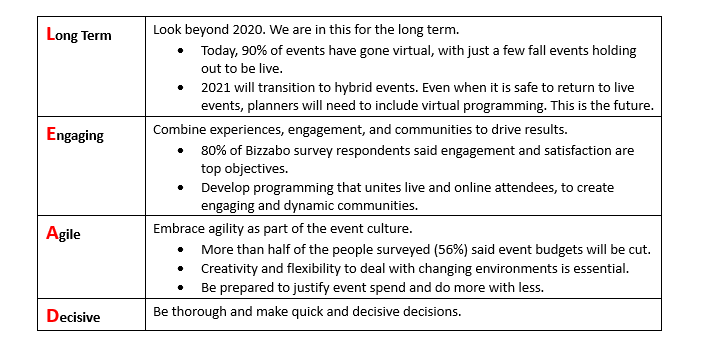It’s a little scary out there. As the world takes tentative steps to reopen and develop post-pandemic protocols, it is clear that the event industry will lag far behind. The economic recovery may take years and the full return to in-person gatherings may take even longer. Even when live events do return, people may be reluctant to travel.
To make matters seem worse, the Bureau of Labor Statistics reported in April that 39.3% of the leisure and hospitality industry was unemployed, and that number will likely increase when the May numbers are reported.
Keep the faith, however, as there is good news! Events will return and when they do, events will be stronger and more impactful than ever before. A recent BizBash poll suggested that 96% of event planners believe that in-person events will return but with more sophisticated, personalized, and measurable experiences. Technology will unleash the real power of events and deliver well-constructed, solid programs.
Event professionals must now be flexible, agile, and creative while pivoting skills to understand the online space and meet ever-changing client, customer, and economic demands for virtual content in the short term and hybrid events longer-term. Here are a few reasons why our industry will continue to prosper.
What’s Happening Now
The future is bright. New technologies are booming, and venture capitalists are entering the market. Despite the uncertainty created by COVID-19 and the fact that many 2020 events have shifted to online environments, we are seeing surprisingly positive results.
Many conferences are seeing increased attendance, greater engagement, and stronger communities than their traditional live exhibitions. The main reason, most likely, is because they have been free of charge. With no registration fees, no travel, no hotel costs, and no borders to cross, more people across the globe who might not have attended in the past are now able to engage within their respective communities. This is good news to many conference and event planners looking to increase awareness, branding, and engagement.
For example, AACR, the American Association for Cancer Research, offered their annual meeting in April as a free virtual program. More than 61,000 people from 140 countries attended virtually, almost 3 times their normal live conference (23,000) attendance. At one point, 24,000 people were watching the keynote address (SOURCE: The Cancer Newsletter, Issue 18, May 1, 2020). Although there was revenue loss, there were significant increases in attendance, engagement, and community participation. These impressive statistics demonstrated people’s desire for information, knowledge, thought leadership and a sense of community. AACR is just one example where demand more than exceeded expectations.
Consider, as well, the BookCon event that was scheduled for 2020 in New York City. Organizers have cancelled the live show and gone virtual. At the live show, attendees typically entered lotteries to gain access to author sessions and book signings, and only a select few could enter the physical room. With a virtual option, the room size can be as large as necessary. Registered attendees may watch and engage in multiple sessions, many of which they, in all likelihood, would not have attended in person.
COVID-19 has forced event organizers to reexamine their objectives and determine which business model works best for them. Many have offered free programming during the economic shutdown but expect that to change once economies open and people get back to work.
It’s important for planners to recognize these opportunities and take advantage of growing brands and attendance. Just a little creativity can increase engagement, interactivity, and participation that could lead to greater future contributions.
What Needs to Happen
Event planners and industry professionals must step up their game and become frontrunners in the post-pandemic world. Clients and customers will rely on planners to innovate, adapt, and change to stay on top, and we can’t wait for the “all clear” signal to start work again. We will engender confidence when we build communities, deliver engaging online content, and develop programming that converges the gap of live and online.
During Bizzabo’s “(almost) in-person” event, Eran Ben-Shushan, Co-Founder and CEO of Bizzabo, introduced the phrase “Lead The Way with L.E.A.D.” to describe the future of events and the industry in general. Bizzabo’s customer survey revealed some interesting facts:

Overall, we need to make online activities more interactive and meaningful, using authentic dialogues and bringing an increased sense of connection with speakers, audience, and attendees.
Embrace Change
Prior to March, the word ‘pivot’ referred to the act of stepping in any direction with one foot while the other one remained in contact with the floor. Today, pivot refers to adopting a business model that addresses the changing times. The need to pivot has been amplified because the future is so uncertain.
Change is the one constant in life, and we must embrace that reality. Let’s not be fearful, however; let’s be innovators. Times of disruption breed innovation. Draw from your organization and your community and move forward. Change requires us to learn new things, master new skills, and develop new qualities, such as adaptability, innovation, and courage.
According to David Adler, Chairman and Founder of BizBash, leadership today means being a “collaboration artist.” The number one skill every event planner should have is this ability to connect people for a purpose. Building opportunities to collaborate leads to stronger connections and better results.
We must continue to understand what people want and need, and how they consume information. We need to deliver technology platforms that teach, test, apply, and measure, as well as address the why, what, when, where, and how of events. This collaboration builds a connection of trust, authenticity, and empathy that is critical to producing the right solution.
The events industry is resilient and will rebound. Let’s be proactive and recommend to our clients what they should be doing versus asking them what they want to do. Understand needs and recommend the right platform even if it means change. Our clients are willing to listen. They are looking for new ideas and new ways to deliver content. We need to embrace this challenge and turn it into a success.
As we continue to explore the future of the event industry, it’s okay to stop and take a breath. We’ve experienced what seems to be a lifetime of change in the last few months. It has been challenging, but it’s also been inspiring to see how we’ve risen to the occasion, found new ways to connect, and started to transform. You can lead the event industry into the future – and we can help. Get in touch to learn more.

